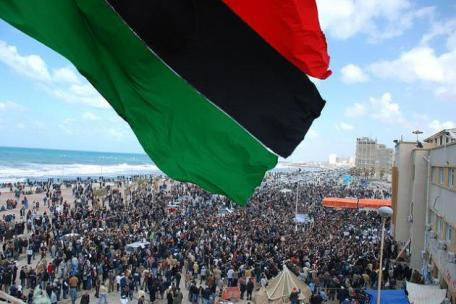The Arab Spring, Twenty Years Earlier

Mohammad Farazmand
In the massive transformations of the twenty-first century, Baghdad was the first fortress of the Arab World to be conquered by Western military powers. In March 2003, when British and American soldiers landed on Iraqi soil, the Arab street fiercely opposed their intervention and to invoke deep-seated memories, compared it with the blood-ridden conquest of Baghdad in the 13th century C.E. by the Mongol ruler Hulagu Khan. The new rulers of Iraq called for the Arab League’s support after the occupation, rejected by the members, who regarded them as pawns of the US.
The world witnessed the conquest of another Arab capital with Western military aid in 2011. However, there were no angry demonstrations and anti-US chants this time, but celebration, collaboration with the West, and a quick recognition of the National Transition Council of Libya. What made the fall of these two Arab capitals different? Has the Arab World changed its attitude?
A glance at the specific motives and military attitudes of Western countries can teach the Middle East nations, and the international community, a lesson or two.
In 2003, US unilateral allegations against Saddam Hussein’s regime were the key motivation for attacking the country. George Bush insisted that the Iraqi regime had assisted alQaeda in perpetrating the 9/11 terrorist attacks, and was covertly following its plan to develop weapons of mass destruction. His claims were of course never proven.
Washington failed to bring the international community on board in 2003. A comprehensive international alliance was never formed, and the UN Security Council refused to bless the operation with its approval. Following a ‘preemptive war’ strategy, US waged a war against Saddam Hussein which took 800 billion dollars out of its treasury, killed more than 4500 Americans, and twenty times more Iraqis (the cost of war for Iraq has not been yet calculated by an independent source.) Nevertheless, Americans have never expressed regret for their misconduct, and assert that all the expenditures were worthy for setting up a model for a democratic state in the Middle East.
The fragile democracy in Iraq failed to inspire the Arab World. Eight years after the fall of Saddam, few countries in the Arab World wish to undergo the Iraqi experience. Even in Libya, the revolutionaries frown upon analyses which compare the country’s situation to that of Iraq in 2003. Iraq is an experience which should never recur.
The Western militaries and politicians seem to have learnt from their vicissitudes in Baghdad. This time there were no glossy slogans claiming combating terrorism or removing the WMD threat. Western countries lined up behind NATO and attacked Libya under the pretext of defending civilians against Qaddafi. More importantly, they also took pains to garner support from the Arab states. This time, the Arab League not only supported the offensive, but two of its members, Qatar and UAE joined the military operation.
UNSC Resolution 1973 approved a no-fly zone over Libya to facilitate NATO operations. Although the resolution has not explicitly supported military action against Libya, it authorized member states “to take all necessary measures to protect civilians.” NATO’s interpretation of the resolution was not rejected by the Council.
The fall Baghdad and Tripoli fitted inside different contexts. The latter transpired amid the Arab Spring and the rise of Arab nations against their authoritarian rulers. While the Libyan opposition launched ground offensives, NATO attacked Qaddafi’s strongholds by air and from the Mediterranean Sea. In the meantime, the UNSC Resolution excluded “a foreign occupation force of any form on any part of the Libyan territory.”
Like the Iraqi experience, the Libyan experience has taught us lessons on how to treat Middle East developments:
The days of unilateral intervention under pretexts such as fighting terrorism or preemptive war are over and cannot gain massive support. Human rights and protection of civilians are now the popular concepts. Middle Eastern countries such as Syria and Yemen which are challenged by popular uprisings will face similar resolutions if they continue their crackdown on citizens. Resolution 1973 will serve as a precedent to authorize members of the international community to militarily intervene wherever measures need to be taken to protect civilians.
The Libyan developments also raise a question among the Iraqis: couldn’t the United States have followed a similar approach in their country to avoid a bitter experience and inspire democratic movements across the Arab World? Twelve years before the occupation of Iraq, and twenty years before the overthrow of Qaddafi, the United Nations established a no-fly zone over Iraq, while the Iraqi citizens were standing up against their tyrant dictator Saddam Hussein. Washington turned a blind eye to Saddam Hussein’s violation of the ban, paving the way for him to massacre the Iraqi Shi’as in the south and the Kurds in the north.
No one in the Arab World regards Iraq as the birthplace of the Arab Spring. However, if the West had opted a more rational attitude towards the Middle East developments, the Arab Spring could have happened twenty years earlier. The Iraqis are entitled to detest the Americans (even though they were the ones who liberated Iraq from Saddam Hussein’s iron fist), and are waiting for the American soldiers to leave their country.
Mohammad Farazmand is Iran’s former ambassador to Bahrain.

